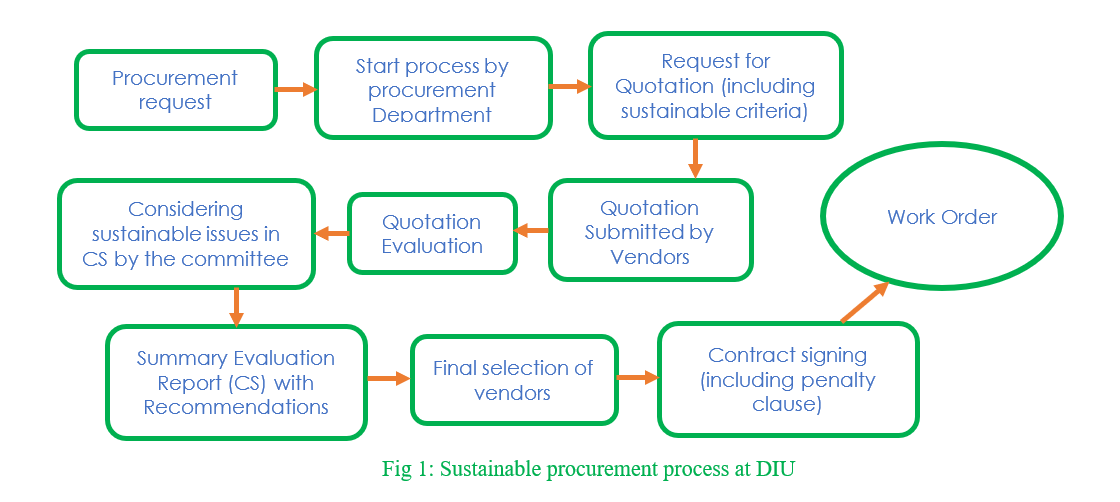Daffodil International University
Sustainable Procurement Strategy
Daffodil International University embraced the agenda of sustainable development goals in their academic and administrative activities upto the optimum level. The Sustainable Procurement Strategy of the university outlines the sustainability viewpoint, identifies requirements, and adopts practices for procurement of products and services. It has been perceived that in case of purchasing huge items of goods in the university considering environmental sustainability was envisaged to be a part of this process. Formulating this policy/ strategy will direct the university authority and the committees who are involved in the procurement process to accomplish the tasks in an efficient manner.
Objectives
- procuring of products and services that ensure maximum efficiency with no or less harm to the environment and sustainability of the earth.
- ensuring the university’s stakeholders that health safety, environmental wellbeing, social responsibility and ecological balance are positively considered while procuring products/services.
- creating awareness and promoting best practices in sustainable procurement across the university.
Scope
This strategy may be reviewed as and when required by the Procurement department in consultation with relevant persons of the university and it applies to everyone who procures and specifies products and services on behalf of DIU.
The sustainable procurement strategy of DIU
- Striving to practice the procurement of recyclable and/or compostable products considering the environmental wellbeing
- Practicing the procurement of products/services that are beneficial and safe for the university, local community, environment and sustainable economic development
- Complying with the DIU’s overall sustainability policy through sustainable procurement practice
- Emphasizing not to procure any products where plastic/ hazardous materials/ chemicals are used in the production process or delivering services
- Prioritizing waste reduction through adopting the 3R concept, (reduce, reuse and recycle).
- Emphasizing and ensuring procurement of less carbon emitting products/ services, energy efficient appliances, water efficient appliances, and zero emission vehicles, etc.
- • Procuring and installing equipment and machinery necessary for generating renewable energy in campus
- Managing or arranging proper training for enhancing the understanding and knowledge of the university staff involved in the procurement process.
- Selecting vendors/suppliers based on their level of social responsibility, commitment and practice towards environmental wellbeing and use of environment-friendly ingredients as well as production process.
- Including the vendor company in the DIU blacklist if it practices use of child labor, modern slavery, noncompliance with the environmental and human rights standards (both national and international).
- Emphasizing the vendor/supplier companies that employ physically challenged and disabled persons
- Encouraging the local community, physically challenged, SME and ethnic minority suppliers/vendors to take part in the bid for university contracts
Sustainable Procurement Process
- Concerned academic or non-academic department will first submit procurement request to the Procurement department (PD) of DIU
- After receiving the procurement request, the PD will immediately start the procurement process
- The PD will circulate the Request for Quotation (RFQ) for inviting vendors/suppliers to submit price quotation with specifications within a stipulated timeline
- The vendors/suppliers will submit their quotations to a specific tender box
- After the submission deadline, the PD will send all the received quotations (intact) to the Quotation evaluation committee (QEC)
- The QEC will properly compare all the vendors’ submitted quoted price with specifications and check their level of social responsibility, sustainable practices, environment-friendly work place, use of hazardous ingredients, child labor use, employing disabled people, economic and other relevant issues.
- The QEC will prepare and submit a summary report (Comparative Statement – CS) with recommendations to the Selection committee.
- The selection committee will finally select the vendor(s)/supplier(s) for awarding the contract
- The PD will inform the selected vendor(s)/supplier(s) and make arrangement for contract signing as per DIU standard.
- At the final stage, the PD will offer work order to the selected vendor/supplier

The above figure demonstrates how the procurement process is accomplished in an effective manner with careful attention on sustainability issues.

